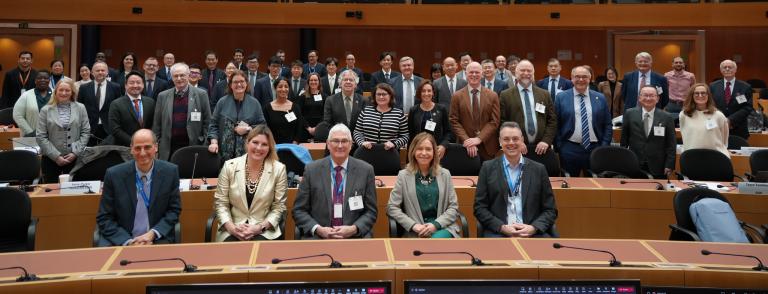The World Meteorological Organisation (WMO) aims to strengthen its partnership with space agencies to bolster cooperation in an era marked by rapid climate, societal, and technological transformations, recognising the critical importance of satellite observations.
Space-based monitoring systems, which constitute around 90 per cent of the data utilised in global weather prediction models, serve as the cornerstone of operations for National Meteorological and Hydrological Services, offering invaluable insights crucial for safeguarding lives and property worldwide on a 24/7 basis.
The WMO community has a longstanding history of collaboration with space agencies, playing a pivotal role in facilitating data sharing, establishing common standards, and enhancing capacity-building efforts, particularly in less developed nations.
Delegates attending the 15th Session of Consultative Meetings on High-Level Policy on Satellite Matters reached a consensus to advance the relationship to a higher level.
WMO Secretary-General Celeste Saulo emphasised the increased importance of collaborative efforts amidst emerging challenges like climate change, water resource management, and space weather forecasting.
“Today, as we confront emerging challenges such as climate change, water resources management, and space weather forecasting, our collaborative efforts are more vital than ever,” said WMO Secretary-General Celeste Saulo.
The event, the first convened in over five years, united high-ranking officials from space agencies and the meteorological sector, including the presidents of WMO's Infrastructure and Services Commissions.
Discussions centred on how WMO can assist space agencies in fulfilling members' requirements for data and information, while also improving accessibility and utilisation of data from current and upcoming satellite systems.
The meeting also delved into the capacity of space-based observations to advance critical WMO strategic objectives, such as Earth System monitoring and prediction, Early Warnings for All, and the Global Greenhouse Gas Watch.
Celeste Saulo said that by harnessing improved Earth observations, the world can significantly enhance the efficacy of these initiatives, providing more timely and precise warnings for at-risk communities and enabling informed decision-making in tackling the challenges of climate change.
“Today, we embark on a journey of cooperation and innovation, leveraging our collective expertise to overcome challenges and achieve our shared vision of a safer, more resilient world,” she said.
WMO Infrastructure Commission President Michel Jean noted that the timing of the meeting is ideal not only from scientific and technological angles but also from a governance standpoint.
“The timing of this meeting is perfect from a scientific and technological perspective but also from a governance perspective,” said WMO Infrastructure Commission President Michel Jean.
He mentioned that upcoming WMO constituent body sessions will focus on enhancing the dynamics of the relationship with space agencies.
Mr Jean also indicated that this emphasis will be evident in the plenary sessions of the Coordination Group on Meteorological Satellites scheduled for June and the Committee on Earth Observation Satellites planned for October.
The meeting specifically addressed various topics, including how to assist Members with limited capacity, particularly concerning Early Warnings for All and strategies for integrating data and users amidst increasing data volumes and capabilities.
It also addressed effective practices and emerging opportunities in collaboration with the commercial satellite sector to advance the Global Greenhouse Gas Watch initiative; the evolving impact of Artificial Intelligence on weather and climate forecasting and its implications for satellite data utilization; the advancement of WMO's space program and its alignment with the WMO Integration Global Observing System Vision (WIGOS) for 2040; and the implementation of the WMO Unified Data Policy, including the definition of core and recommended space-based observations across all application areas.
Latest Stories
-
U.S. visa is a privilege, not a right – US Embassy in Ghana
9 minutes -
Big Chef S4: Rena bids her brother, Jaden, goodbye; Serwaa clinches 2nd Star Chef title
17 minutes -
Train Africa’s teachers in AI – or risk an education crisis
21 minutes -
TVET holds key to tackling youth unemployment and driving development – Mine Contractors’ Secretary
27 minutes -
Macroeconomic Stability at Last? An Odyssey of The Economic Upheavals in The 4th Republic and The GoldBod Experiment
38 minutes -
Breaking U.S. laws can lead to deportation, future bans – Embassy in Ghana warns visa holders
40 minutes -
Cape Coast Assembly begins demolition of unsafe buildings following fatal collapse
43 minutes -
Rapper Fat Joe accused of sex with minors in $20m lawsuit by former hypeman
45 minutes -
Heifer International announces winners at AYuTe NextGen 2025: Youth-led innovations set to transform Africa’s agriculture
45 minutes -
Fisheries Ministry announces 2025 closed season
48 minutes -
Reality of critical patient care when nurses and midwives withdraw services
56 minutes -
Ghana to vaccinate 2.2 million girls against Human Papillomavirus (HPV)
58 minutes -
I’m not just passionate about music, I’m hungry for it – Gyakie
1 hour -
I haven’t started spending the $5,000 gift from Davido – Ghanaian Tiktoker
1 hour -
Smart Procurement: Using AI to combat fraud and boost efficiency in Ghana’s public spending
1 hour

